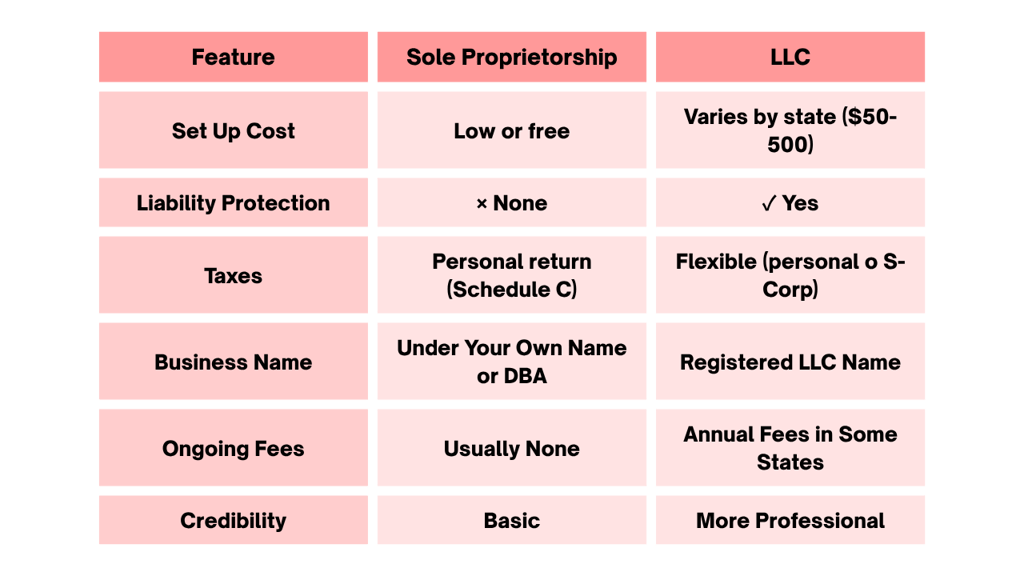LLC vs. Sole Proprietorship: Which One Is Right for You?
Choosing between an LLC and a sole proprietorship? This guide breaks down the key differences to help you pick the right structure for your business.
ENTREPRENEURSHIPMICRO-ENTERPRISES SIDE HUSTLERSFREELANCERSSMALL BUSINESSLEGAL & FINANCE
Agile Mediaz LLC
1/5/20254 min read


Starting your own business is more than a dream—it's a powerful step toward financial freedom, personal fulfillment, and creative control. But before the sales start rolling in or you launch your website, there’s a key decision every entrepreneur must make: what business structure should I choose? Two of the most common options for small business owners, freelancers, and digital entrepreneurs are the Sole Proprietorship and the Limited Liability Company (LLC).
This isn’t just legal jargon—it’s a foundational choice that can influence your taxes, legal risk, branding, and your ability to scale in the future. Whether you’re launching an Etsy shop, offering freelance services, or building a consulting business, your business structure plays a critical role in protecting your assets and positioning your brand professionally. In this guide, we’ll walk you through the pros, cons, and best-use cases of each so you can confidently choose the right path for your business goals and budget.
What Is a Sole Proprietorship?
A sole proprietorship is the simplest and most affordable way to run a business. If you're working under your own name and haven’t registered your business with the state, chances are, you’re already operating as a sole proprietor. There’s no separate legal entity—you and the business are one and the same. This makes it easy to get started, but it also means you’re taking on all the risks yourself. You’re personally responsible for any debts, lawsuits, or obligations your business takes on. That said, for many freelancers or early-stage entrepreneurs, it’s a good, low-cost place to begin.
Pros of a Sole Proprietorship:
Easy to start – No formal paperwork required in most states.
Low cost – Usually only requires a local business license or DBA ("Doing Business As") filing.
Simple taxes – You file business income on your personal tax return using Schedule C.
Cons:
No legal separation – You and your business are the same. If someone sues your business, they can come after your personal assets (car, savings, home, etc.).
Limited credibility – Some clients or vendors may take LLCs more seriously.
Harder to scale – It’s less flexible for bringing on partners or funding.
Best for:
Freelancers, consultants, side hustlers, and hobby businesses.
Low-risk businesses with minimal legal exposure.
What Is an LLC?
A LLC (Limited Liability Company) is a more formal business structure that offers a key benefit: limited liability protection. That means your business is legally separate from you as an individual. If your business runs into legal trouble, your personal assets are generally protected. You also get more flexibility with how your business is taxed, and you can choose to be taxed like a sole proprietor or as an S-Corp if it benefits your financial situation. LLCs do require paperwork and filing fees, but for many business owners, the extra effort is worth the peace of mind.
Pros of an LLC:
Limited liability protection – Your personal assets are typically protected from business debts or lawsuits.
Professional image – Adds legitimacy to your business when dealing with clients, banks, or investors.
Flexible taxes – You can choose to be taxed as a sole proprietor, partnership, or even an S-Corp.
Cons:
Startup costs – You’ll need to pay a filing fee (often $50–$500 depending on your state).
Ongoing requirements – Some states require annual reports and fees.
Slightly more complex taxes – Depending on how you elect to be taxed, you may need help from an accountant.
Best for:
Business owners who want liability protection.
Anyone planning to scale, hire employees, or operate long-term.
Entrepreneurs with moderate to high-risk exposure.
How to Decide Which Is Right for You
If you’re still on the fence, it helps to consider a few questions. Do you want to protect your personal assets? Do you plan to grow, hire help, or pursue funding? Will having a registered business structure make you look more credible to customers or clients? And can you afford the small investment to form and maintain an LLC? If your answers lean toward growth, professionalism, and protection, an LLC is likely the better choice. But if you're just getting started and want to keep it simple and cost-effective, a sole proprietorship may work just fine for now—and you can always switch later.
Final Thoughts
Choosing between a Sole Proprietorship and an LLC isn't just about what’s easier or cheaper right now—it’s about setting up your business for long-term success and security. A sole proprietorship offers simplicity and speed, making it perfect for side hustlers, freelancers, and low-risk ventures just getting off the ground. But if you're thinking big—about expanding, taking on clients, hiring staff, or protecting your personal finances—an LLC offers structure, professionalism, and peace of mind that grows with you.
Remember, your business structure can evolve as your needs change. Many entrepreneurs start as sole proprietors and upgrade to LLCs once they gain traction. The key is to make a decision that aligns with your current reality while keeping your future vision in mind. Whatever you choose, the most important thing is to get started.


Connect
Empowering small businesses through digital marketing solutions.
Explore
Innovate
contact@agilemediaz.net
© 2024. All rights reserved.

